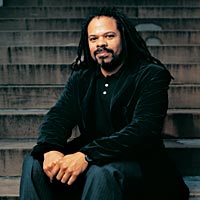|
Photograph: Jeff Sciortino
 |
|
Poet-professor John Keene |
When students walk into John Keene’s fiction class at Northwestern University, they meet a confident, Harvard-educated professor who wears dreadlocks and speaks five languages. The person they don’t encounter is “John-John,” a shy kid with close-cropped hair who was the occasional target of schoolyard bullies.
Those bullies probably never imagined they would end up inspiring their hapless victim, who in 1995 poured his experiences into his breakout autobiographical work, Annotations. In the book, Keene blurred the lines between prose and poetry, a technique he advances in his anticipated second book, Seismosis, due out this month. “I’m always amazed by writers who can write ten books in the same style,” says the 40-year-old, who splits his time between Rogers Park and Jersey City. “As you learn and develop, you approach things differently.”
The first offering by an independent Ohio publisher named 1913 Press, Seismosis reflects Keene’s collaboration with a friend, Brooklyn-based visual artist Christopher Stackhouse. In the 100-page work, Keene riffs on abstract themes such as linearity, form, and chaos-and even the idea of abstraction itself-in half-poetic, half-philosophic speculations spurred by Stackhouse’s fevered scribbles. “I am behind an oscillating screen, the scene of an act, envisioning beauty and its planar articulation,” Keene writes. “I am in your chamber cinema.”
Last October, the Mrs. Giles Whiting Foundation named Keene one of ten American writers with exceptional talent, joining a roster of past awardees that includes August Wilson and Tony Kushner. Keene’s style of free-associating wordplay has prompted the label “experimental,” a description he challenges. “Every writer facing a blank page is experimental.”
Growing up in St. Louis, Keene’s family placed a high value on education. After high school, the bookish young man headed off to Harvard. While working odd jobs after graduation, he joined the burgeoning Dark Room Collective, a group of emerging young black poets that included Thomas Sayers Ellis and Kevin Young. “I was always a shy person,” he says, “but with the collective, I gained more confidence.” And as for the nickname John-John? He quietly chuckles. “Nobody has called me that since junior high.”


